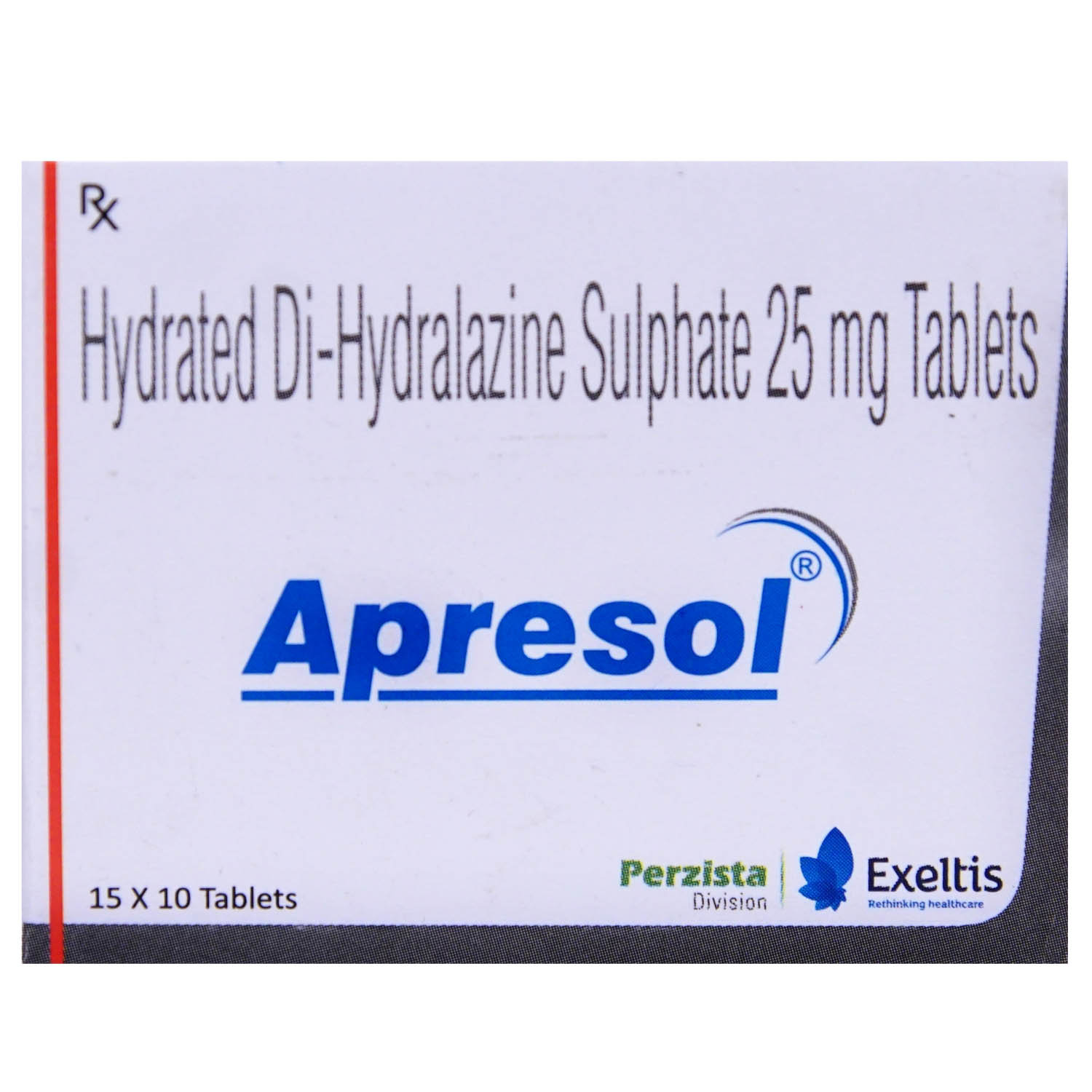Nepresol 25mg Tablet
MRP ₹80
(Inclusive of all Taxes)
₹12.0 Cashback (15%)
Provide Delivery Location
Online payment accepted
 Prescription drug
Prescription drugWhats That
Composition :
Manufacturer/Marketer :
Consume Type :
Return Policy :
About Nepresol 25mg Tablet
Nepresol 25mg Tablet belongs to a group of medicines called 'antihypertensive' used alone or together with other medicines to treat high blood pressure (hypertension), heart-related chest pain (angina), heart rhythm disorder (arrhythmia) and preventing symptoms of migraine headache and tremors (fits). It affects our heart and blood circulatory system, especially controlling blood pressure through arteries and veins. High blood pressure adds to the workload of the heart and arteries. If it continues for a long time, the heart and arteries may not function properly. This can damage the blood vessels of the brain, heart, and kidneys, resulting in a stroke, heart failure, or kidney failure. Lowering blood pressure may reduce the risk of stroke and heart attacks.
Nepresol 25mg Tablet belongs to a class of drugs called ‘peripheral vasodilators’ which acts on the blood vessels directly and relaxes them, resulting in lowered blood pressure levels. Thus, it helps in reducing your risk of having a stroke, a heart attack, other heart problems, or kidney problems in the future. This medicine needs to be taken regularly to be effective.
Nepresol 25mg Tablet can be taken orally with or without food or as directed by your physician. Swallow the whole tablet with a glass of water. Do not crush, chew, or break it. Nepresol 25mg Tablet is preferable to take at the same time every day for better results. Nepresol 25mg Tablet is generally safe to consume. You may have a common side like an abnormal heartbeat, headaches, low blood pressure, diarrhoea, and feeling sick and being sick. These side effects are usually mild and short-lived. However, if the side effects are persistent, reach out to your doctor.
Don't stop taking $ name without talking to your doctor first. Stopping Nepresol 25mg Tablet gradually may cause changes in your heart rhythm and blood pressure, cause chest pain, or a heart attack. Your doctor will lower your dose gradually over a period of time to help prevent these symptoms. You should not use Nepresol 25mg Tablet if you have a very slow heartbeat, asthma, serious heart condition (sick sinus syndrome), or any heart blockage. It should not be given to the children less than 12 years of age. Before taking Nepresol 25mg Tablet, you should tell the doctor if you have any muscle disorder (myasthenia gravis, rhabdomyolysis), breathing problem (COPD, bronchitis, emphysema), low blood sugar level (hypoglycaemia), low blood pressure (hypotension), depression, previous heart failure, liver/kidney disease, thyroid hormone disorder, adrenal gland cancer, or problems with circulation (Raynaud’s syndrome).
Uses of Nepresol 25mg Tablet
Directions for Use
Key Benefits
Nepresol 25mg Tablet plays a vital role in relaxing the muscles in the walls of your blood vessels. This ensures that your blood vessels expand, reducing your blood pressure and allowing blood and oxygen to flow more easily throughout your body and helps in reducing your risk of having a stroke, a heart attack, other heart problems, or kidney problems in the future. This medicine needs to be taken regularly to be effective.
Storage
Drug Warnings
Don't stop taking $ name without talking to your doctor first. Stopping Nepresol 25mg Tablet gradually may cause changes in your heart rhythm and blood pressure, cause chest pain, or a heart attack. Your doctor will lower your dose gradually over a period of time to help prevent these symptoms. You should not use Nepresol 25mg Tablet if you have a very slow heartbeat, asthma, serious heart condition (sick sinus syndrome), or any heart blockage. Children weighing less than 4.5 pounds should not be given Nepresol 25mg Tablet. It should not be given to the children less than 12 years of age. Before taking Nepresol 25mg Tablet you should tell the doctor if you have any muscle disorder (myasthenia gravis, rhabdomyolysis), breathing problem (COPD, bronchitis, emphysema), low blood sugar level (hypoglycaemia), low blood pressure (hypotension), depression, previous heart failure, liver/kidney disease, thyroid hormone disorder, adrenal gland cancer, or problems with circulation (Raynaud’s syndrome).
Drug-Drug Interactions
Drug-Drug Interactions
Login/Sign Up
Drug-Food Interactions
Drug-Food Interactions
Login/Sign Up
Diet & Lifestyle Advise
- Keep your weight under control with BMI 19.5-24.9.
- Do regular physical activity or exercise for at least 150 minutes per week, or about 30 minutes most days of the week. Doing this can help you to lower your raised blood pressure by about 5 mm of Hg.
- Option for a diet rich in whole grains, fruits, veggies and low-fat dairy products.
- Limit intake of sodium chloride (table salt) in your daily diet to 2300 mg per day or less than 1500 mg is ideal for most adults.
- If you are taking alcohol then only one serving for women and two servings for men is advisable.
- Quitting smoking is the best strategy to lower the risk of heart disease.
- Avoid chronic stress as it can raise your blood pressure. Try to enjoy and spent time with your loved ones to cope with stress and practice mindfulness techniques.
- Try to include heart-healthy omega 3 fatty acid containing food drinks in your daily diet. You can also use low-fat cooking oil like olive oil, soybean oil, canola oil, and coconut oil can help in lowering your elevated blood pressure.
Side Effects of Nepresol 25mg Tablet
- Headache
- Loss of appetite
- Nausea
- Vomiting
- Diarrhoea
- Fast heart rate
Habit Forming
Therapeutic Class
All Substitutes & Brand Comparisons
RX
Out of StockHydral-25 Tablet 10's
Vajra Life Science Pvt Ltd
₹72
(₹6.48 per unit)
9% CHEAPERRX
Apresol 25 Tablet 10's
Ordain Health Care Global Pvt Ltd
₹81
(₹7.29 per unit)
1% COSTLIERRX
Apresol 25 Tablet 30's
Exeltis India
₹327
(₹9.81 per unit)
36% COSTLIER
Author Details
We provide you with authentic, trustworthy and relevant information
Drug-Diseases Interactions
Drug-Diseases Interactions
Login/Sign Up
FAQs
Drug-Drug Interactions Checker List
- DIAZOXIDE
- ISOCARBOXAZID
- TRANYLCYPROMINE
- PHENELZINE
- LINEZOLID
- METHYLENE BLUE
- RASAGILINE
- SELEGILINE
Special Advise
Monitor your blood pressure daily and if there is too much of fluctuation then immediately contact your doctor.
Disease/Condition Glossary
High blood pressure: Blood pressure is the measurement of the force that our heart uses to pump blood to all parts of the body. Hypertension is a chronic condition when blood pressure and the workload of the heart is too high. This condition can lead to hardened arteries (blood vessels), decreasing the blood and oxygen flow to the heart. Raised blood pressure can cause chest pain (angina) and heart attack (when blood supply to the heart is blocked). Additionally, high blood pressure also causes brain damage (stroke) and kidney failure. High blood pressure can be diagnosed with the help of a blood pressure monitor or sphygmomanometer. Systolic pressure is the pressure when the heart pumps blood out. On the other hand, diastolic pressure is the pressure when your heart is at the resting stage between heartbeats. If your blood pressure is 140/90 mm of Hg, it means the systolic pressure is 140 mm of Hg and, diastolic pressure is 90 mm of Hg. Ideal blood pressure should be between 90/60 mm of Hg and 120/80 mm of Hg.

Have a query?
Alcohol
Safe if prescribed
You are recommended not to consume alcohol along with Nepresol 25mg Tablet to avoid unpleasant side-effect of low blood pressure causing dizziness or drowsiness.
Pregnancy
Consult your doctor
Nepresol 25mg Tablet is a category C pregnancy drug. Nepresol 25mg Tablet is not recommended during pregnancy unless your doctor considers it essential. Your doctor will weigh the benefits and any potential risks before prescribing it to you.
Breast Feeding
Consult your doctor
Take Nepresol 25mg Tablet only when prescribed, it is known to pass on in a limited quantity via breast milk to the child. Your doctor will weigh the benefits and any potential risks before prescribing it to you.
Driving
Safe if prescribed
Nepresol 25mg Tablet is unlikely to affect your ability to drive or to operate machinery. However, some people may occasionally feel dizzy or tired when taking Propranolol. If this happens to you, ask your doctor for advice.
Liver
Consult your doctor
Nepresol 25mg Tablet to be taken with caution, especially if you have a history of Liver diseases/conditions. The dose may have to be adjusted by your doctor.
Kidney
Consult your doctor
Nepresol 25mg Tablet to be taken with caution, especially if you have a history of Kidney diseases/conditions. The dose may have to be adjusted by your doctor.
Children
Safe if prescribed
The safety and efficacy of Nepresol 25mg Tablet in children have not been established. Nepresol 25mg Tablet is not recommended in children.









